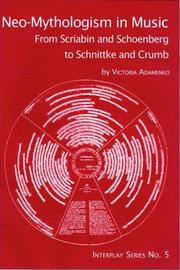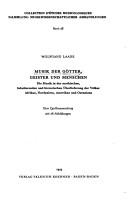| Listing 1 - 10 of 14 | << page >> |
Sort by
|
Book
ISBN: 9073023386 Year: 1994 Publisher: Leiden Plantage
Abstract | Keywords | Export | Availability | Bookmark
 Loading...
Loading...Choose an application
- Reference Manager
- EndNote
- RefWorks (Direct export to RefWorks)
Music and mythology. --- Music --- Psychological aspects. --- Music and mythology --- Music psychology --- Mythology and music --- Mythology --- Psychological aspects --- Psychology

ISBN: 1576472817 157647125X Year: 2007 Publisher: Boydell & Brewer
Abstract | Keywords | Export | Availability | Bookmark
 Loading...
Loading...Choose an application
- Reference Manager
- EndNote
- RefWorks (Direct export to RefWorks)
This investigation aims to demonstrate how it is much more rewarding to view quintessential Western composers in a culturally non-purist and non-exclusive context, rather than insist on incongruity of independent cultural experiences. It has customarily been hard to overcome the divisions between the mind of a highly sophisticated art-musician and the mind of an aboriginal maker of music, myth, and ritual. Both neo-mythologism and neo-ritualism of the twentieth century clearly provide foundations for transcending the cultural borders. The role of mythification in compositional processes has remained outside the main focus of musicology. This book examines the different aspects of composers' thoughts from philosophical views and theoretical systems to operatic librettos and the musical fabric itself, including form, pitch organization, and instrumentation.
Music --- Music and mythology. --- Hermeneutics. --- Mythology and music --- Mythology --- Hermeneutics (Music) --- Musical aesthetics --- Aesthetics --- Music theory --- Interpretation, Methodology of --- Criticism --- Philosophy and aesthetics. --- Philosophy

ISBN: 3873205580 Year: 1975 Publisher: Baden-Baden Valentin Koerner
Abstract | Keywords | Export | Availability | Bookmark
 Loading...
Loading...Choose an application
- Reference Manager
- EndNote
- RefWorks (Direct export to RefWorks)
muziekgeschiedenis --- Comparative literature --- Music --- Ethnology. Cultural anthropology --- etnomusicologie --- Thematology --- Oceania with Australia --- Africa --- Asia --- America --- Music and mythology --- Mythology and music --- Mythology --- Music and mythology. --- 78.31 --- 78.84
Book
ISBN: 9781783273713 1783273712 9781787444409 1787444406 Year: 2019 Publisher: Suffolk Boydell & Brewer
Abstract | Keywords | Export | Availability | Bookmark
 Loading...
Loading...Choose an application
- Reference Manager
- EndNote
- RefWorks (Direct export to RefWorks)
"Myths and stories offer a window onto medieval and early modern musical culture. Far from merely offering material for musical settings, authoritative tales from classical mythology, ancient history and the Bible were treated as foundations for musical knowledge. Such myths were cited in support of arguments about the uses, effects, morality and preferred styles of music in sources as diverse as theoretical treatises, defences or critiques of music, art, sermons, educational literature and books of moral conduct. Newly written literary stories too were believed capable of moral instruction and influence, and were a medium through which ideas about music could be both explored and transmitted. How authors interpreted and weaved together these traditional stories, or created their own, reveals much about changing attitudes across the period. Looking beyond the well-known figure of Orpheus, this collection explores the myriad stories that shaped not only musical thought, but also its styles, techniques and practices. The essays show that music itself performed and created knowledge in ways parallel to myth, and worked in tandem with old and new tales to construct social, political and philosophical views. This relationship was not static, however; as the Enlightenment dawned, the once authoritative gods became comic characters and myth became a medium for ridicule. Overall, the book provides a foundation for exploring myth and story throughout medieval and early modern culture, and facilitating further study into the Enlightenment and beyond."-- Page [4] of cover.
Music --- Music and mythology --- History --- Mythology --- Myth --- Civilization, Medieval --- Medieval civilization --- Middle Ages --- Civilization --- Chivalry --- Renaissance --- Demythologization --- God --- Gods --- Religion --- Myths --- Legends --- Religions --- Folklore --- Mythology and music --- History and criticism
Book
ISBN: 1009028677 1316563065 110714874X 1009028391 Year: 2021 Publisher: Cambridge, England : Cambridge University Press,
Abstract | Keywords | Export | Availability | Bookmark
 Loading...
Loading...Choose an application
- Reference Manager
- EndNote
- RefWorks (Direct export to RefWorks)
Where does music come from? What kind of agency does a song have? What is at the root of musical pleasure? Can music die? These are some of the questions the Greeks and the Romans asked about music, song, and the soundscape within which they lived, and that this book examines. Focusing on mythical narratives of metamorphosis, it investigates the aesthetic and ontological questions raised by fantastic stories of musical origins. Each chapter opens with an ancient text devoted to a musical metamorphosis (of a girl into a bird, a nymph into an echo, men into cicadas, etc.) and reads that text as a meditation on an aesthetic and ontological question, in dialogue with 'contemporary' debates - contemporary with debates in the Greco-Roman culture that gave rise to the story, and with modern debates in the posthumanities about what it means to be a human animal enmeshed in a musicking environment.
Music, Greek and Roman --- Music and mythology. --- Metamorphosis --- Metamorphosis (in religion, folk-lore, etc.) --- Mythology and music --- Mythology --- Greek music --- Music, Greek (Ancient) --- Music, Roman --- Roman music --- Music --- History and criticism. --- Philosophy and aesthetics. --- Mythology.
Book
Abstract | Keywords | Export | Availability | Bookmark
 Loading...
Loading...Choose an application
- Reference Manager
- EndNote
- RefWorks (Direct export to RefWorks)
Greek music --- Music [Greek ](Ancient) --- Music [Greek and Roman ] --- Music [Roman ] --- Music and mythology --- Musique et mythologie --- Musique grecque (Ancienne) --- Musique grecque et romaine --- Musique romaine --- Muziek [Griekse ](Oude) --- Muziek [Griekse en Romeinse ] --- Muziek [Romeinse ] --- Muziek en mythologie --- Mythologie en muziek --- Mythologie et musique --- Mythology and music --- Music, Greek and Roman --- History and criticism --- Histoire et critique
Book
ISBN: 3931264300 9783931264307 Year: 2005 Publisher: Schliengen Argus
Abstract | Keywords | Export | Availability | Bookmark
 Loading...
Loading...Choose an application
- Reference Manager
- EndNote
- RefWorks (Direct export to RefWorks)
Die Zusammenarbeit eines Komponisten mit einem Maler, die beide auch bemerkenswerte Schriftsteller, also Doppelbegabungen waren, zeugt von einem Kunstwillen, der - geradezu >postmodern< - herkömmliche Spartengrenzen durchbrach. Die Oper >Orpheus und Eurydike<, 1926 höchst erfolgreich in Kassel uraufgeführt, steht im Mittelpunkt dieser Betrachtung und stellt die Frage, wie sich Literatur, Theater und Musik kreativ und innovativ begegnen und durchdringen können. Dieses Werk des 23jährigen Krenek, das auf einem 1915 geschriebenen Text Oskar Kokoschkas basiert, ist in seiner wilden und unmittelbaren Expressivität heute erstaunlich aktuell. Aber wie wäre Kokoschkas und Kreneks Interpretation des alten Orpheus-Mythos aus den zwanziger Jahren des 20. Jahrhunderts auf der Bühne des 21. Jahrhunderts zu realisieren? Das Buch versucht, Antworten auf diese Frage zu geben. Weitere Informationen finden Sie im Internet unter www.editionargus.de
Eurydice (Greek mythology) in opera. --- Music and mythology. --- Orpheus (Greek mythology) in opera. --- Krenek, Ernst --- Kokoschka, Oskar --- Kokoschka, Oskar, --- Krenek, Ernst, --- Krenek --- Krenek, Ernst; Orpheus und Eurydike --- Criticism and interpretation. --- Orpheus und Eurydike. --- Krenek, Ernst. --- Kokoschka, Oskar. --- Orpheus und Eurydike --- Wien <2001> --- Wien <2001>. --- Eurydice (Greek mythology) in opera --- Music and mythology --- Orpheus (Greek mythology) in opera --- Mythology and music --- Mythology
Book
ISBN: 1787444406 Year: 2019 Publisher: Suffolk : Boydell & Brewer,
Abstract | Keywords | Export | Availability | Bookmark
 Loading...
Loading...Choose an application
- Reference Manager
- EndNote
- RefWorks (Direct export to RefWorks)
Myths and stories offer a window onto medieval and early modern musical culture. Far from merely offering material for musical settings, authoritative tales from classical mythology, ancient history and the Bible were treated as foundations for musical knowledge. Such myths were cited in support of arguments about the uses, effects, morality, and preferred styles of music in sources as diverse as theoretical treatises, defences or critiques of music, art, sermons, educational literature, and books of moral conduct. Newly written literary stories too were believed capable of moral instruction and influence, and were a medium through which ideas about music could be both explored and transmitted. How authors interpreted and weaved together these traditional stories, or created their own, reveals much about changing attitudes across the period. Looking beyond the well-known figure of Orpheus, this collection explores the myriad stories that shaped not only musical thought, but also its styles, techniques, and practices. It shows that music itself performed and created knowledge in ways parallels to myth, and worked in tandem with old and new tales to construct social, political, and philosophical views. This relationship was not static, however; as the Enlightenment dawned, the once authoritative gods became comic characters and myth became a medium for ridicule. Overall, it provides a foundation for exploring myth and story throughout medieval and early modern culture, and facilitating further study into the Enlightenment and beyond. Contributors: Jamie Apgar, Katie Bank, Samantha Bassler, Katherine Butler, Elina G. Hamilton, Sigrid Harris, Ljubica Ilic, Erica Levenson, John MacInnis, Patrick McMahon, Aurora Faye Martinez, Jacomien Prins, Tim Shephard, Jason Stoessel, Férdia J. Stone-Davis, Amanda Eubanks Winkler.
Music and mythology --- Music --- Mythology. --- Myth. --- Civilization, Medieval. --- Mythology and music --- Mythology --- Civilization, Medieval --- Medieval civilization --- Middle Ages --- Civilization --- Chivalry --- Renaissance --- Demythologization --- God --- Gods --- Religion --- Myths --- Legends --- Religions --- Folklore --- Myth --- History --- History and criticism. --- Art. --- Classical Mythology. --- Early Modern. --- Educational Literature. --- Enlightenment. --- Medieval. --- Moral Conduct. --- Music. --- Musical Knowledge. --- Sermons. --- Story.
Book
ISBN: 9069350327 Year: 1997 Publisher: Rotterdam Aristos
Abstract | Keywords | Export | Availability | Bookmark
 Loading...
Loading...Choose an application
- Reference Manager
- EndNote
- RefWorks (Direct export to RefWorks)
Comparative religion --- Music --- anno 1500-1799 --- anno 1800-1999 --- Antiquity --- Beschaving [Klassieke ] in de kunst --- Civilisation classique dans l'art --- Civilization [Classical ] in art --- Classical civilization in art --- Klassieke beschaving in de kunst --- Music and mythology --- Musique et mythologie --- Muziek en mythologie --- Mythologie [Klassieke ] in de kunst --- Mythologie classique dans l'art --- Mythologie en muziek --- Mythologie et musique --- Mythology [Classical ] in art --- Mythology and music --- #gsdbM

ISBN: 9027979189 3110808757 9783110808759 9789027979186 Year: 2012 Volume: 51 Publisher: Berlin Boston
Abstract | Keywords | Export | Availability | Bookmark
 Loading...
Loading...Choose an application
- Reference Manager
- EndNote
- RefWorks (Direct export to RefWorks)
No detailed description available for "Myth and Music".
Music and mythology. --- Music --- Philosophy and aesthetics. --- Semiotics. --- Semiotics --- Wagner, Richard --- Stravinski, Igor --- Sibelius, Jean --- -Music --- -Music and mythology --- Mythology and music --- Mythology --- Art music --- Art music, Western --- Classical music --- Musical compositions --- Musical works --- Serious music --- Western art music --- Western music (Western countries) --- Philosophy and aesthetics --- Hermeneutics (Music) --- Musical aesthetics --- Aesthetics --- Philosophy --- Music and mythology --- Music theory --- Sémiotique et musique --- Sémiotique et musique. --- Sémiotique et musique.
| Listing 1 - 10 of 14 | << page >> |
Sort by
|

 Search
Search Feedback
Feedback About UniCat
About UniCat  Help
Help News
News